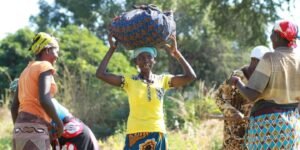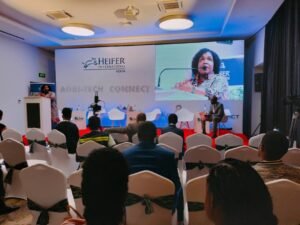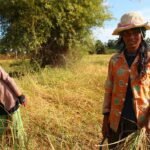| IFAD calls for a robust and ambitious agreement at biodiversity COP to protect the future of rural communities and food security around the world With biodiversity declining to alarming levels around the world, the International Fund for Agricultural Development (IFAD) calls upon leaders participating in the biggest global biodiversity conference in a decade starting tomorrow, to reach a robust agreement which preserves, restores and promotes biodiversity, thus ensuring future global food security and protecting the livelihoods of rural communities everywhere.
“We are at a critical juncture. The rapidly unfolding biodiversity decline means lower food production and less diverse foods. It will further exacerbate hunger and malnutrition levels and ultimately threaten global food security and the livelihoods of hundreds of millions of small-scale farmers in developing countries, “said IFAD President Alvaro Lario, ahead of the fifteenth Conference of the Parties (COP 15) to the UN Convention on Biological Diversity taking place from 7 to 19 December. “COP 15 must result in tangible commitments and action to conserve the world’s biodiversity. We need an agreement that is ambitious – and with a clear plan of action, financing, and tracking mechanism.”
The world’s food production depends on a web of biodiversity made up of plants, animals and micro-organisms, and the interactions among them. But increasing biodiversity losses, with one million species that are at the risk of extinction, and 2 billion hectares of land already degraded, is a major threat to small-scale farmers who rely directly on healthy and biologically diverse ecosystems to grow healthy and abundant food.
Small-scale farmers produce one third of the world’s food – about 80 percent of the food in Africa and Asia – and are crucial to global food security. Hunger has grown in recent years – about 828 million people suffered from hunger in 2021. Small-scale producers are also more likely to incorporate, grow and sustain agro-biodiverse systems while producing food. COP15 aims to adopt a new global accord to halt and reverse the loss of the planet’s plants, animals and ecosystems. The Post 2020 Global Biodiversity Framework is a strategy that provides goals and targets for countries to work towards individually and collectively in the next decade and beyond.
“IFAD is committed to accelerate efforts to protect biodiversity through its investments,” further explained Lario. “Rural communities and small-scale farmers are important custodians of biodiversity, growing a wider range of species and varieties than large farms.”
Through its programmes, IFAD promotes practices such as agroecology, agroforestry as well as many other nature-based solutions. These include cropland, rangeland, peatlands and mangrove restoration which not only enhance biodiversity but also bring important food security benefits. IFAD also supports the production of local, neglected and indigenous crops.
Last year, IFAD adopted its first biodiversity strategy to facilitate the protection, sustainable use and promotion of biodiversity in its operations and committed to focus 30 percent of its climate finance to support nature-based solutions in small-scale agriculture by 2030. It has since then developed a methodology to track financing related to nature-based solutions and a core biodiversity indicator to measure biodiversity improvements in its investments.
Read more on IFAD’s work in biodiversity: IFAD at the Convention on Biological Diversity Our planet is losing its biodiversity. Here are five ways IFAD and rural people are protecting it
How farmers around the world are protecting nature’s delicate balance – and reaping the rewards |







